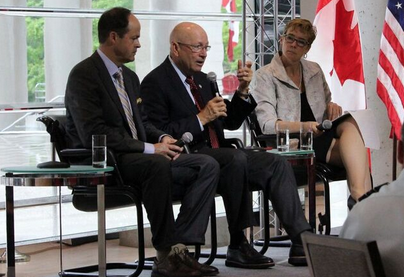
Former NORAD and US Northern Command commander, retired USAF Gen. Victor Renuart (center) discusses NORAD at the Canadian Embassy in Washington. Also on stage are former deputy NORAD commander, retired Royal Canadian Air Force Gen. Thomas Lawson, and Laura Dawson, director of the Wilson Center's Canada Institute. Embassy of Canada Photo.
While North American Aerospace Defense Command will be an evolutionary rather than revolutionary organization, it will have to deal with revolutionary changes to the threat environment, the former commander of NORAD and the US Northern Command told a Washington audience Thursday.
Retired Gen. Victor Renuart made the comments at the Canadian Embassy during a breakfast held as the US-Canadian organization marks its 60th anniversary.
While he said he did not think? NORAD is likely to fundamentally change its “relational structure” because both the US and Canada have a strong opinion on its value, “below the level of the water, the duck’s going to have to pedal really fast to figure out how does adjust to those revolutionary changes that could occur in cyber, and space, and in some high-tech developments.”
He pointed to hypersonic glide vehicles as one example of such a challenge.
“Today we don’t have the perfect warning system to be able to detect and determine their intent, or even how do we respond to them, so there’s an investment that needs to occur in that warning structure,” he said.
He said he sees NORAD as central to the detection and determination of a threat, as well as warning on that threat.
“I think that is continued in space. I think cyber becomes a lot harder because it’s pervasive, it’s in everything we do, to a degree, and so that one will take some time to evolve in a way that NORAD may have a role, so I think there’s still work to be done there,” he said.
On peer competition, in which US officials point particularly to the threat from Russia and China, he said, “I think we have some interesting frenemies out there.”
The US, he said, trades with China and, to some extent, Russia, but US NATO allies trade heavily with Russia, particularly depending on Russia for energy, meaning “while they are a potential threat, they are also someone we have to deal with in a more conventional way.”
It “becomes NORAD’s role,” he said, “to understand how does it continue to detect, to provide deterrent information,” and then give national leaders a decision to make on how to respond.